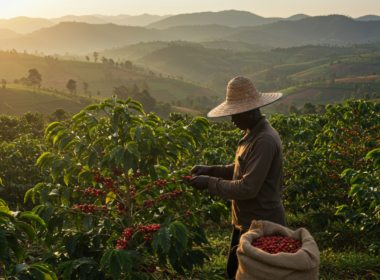There’s coffee, and then there’s Ugandan coffee, the kind that doesn’t just wake you up but makes you wonder why you’ve been settling for anything less. While Ethiopia often takes the spotlight as Africa’s coffee cradle, Uganda has been quietly, yet steadily, building a reputation as a top-tier coffee producer. But what makes Ugandan coffee so special? And why should Europe and the world be paying attention? Let’s break it down, sip by sip.
A Coffee Powerhouse You Might Be Sleeping On
Uganda isn’t just playing in the coffee game; it’s leading. As of the 2023/2024 season, Uganda exported over 6.13 million bags of coffee, marking a 6.33% increase from the previous year. The industry supports around 1.7 million smallholder farmers, each cultivating an average of 0.18 hectares—proving that big impact often comes in small, dedicated packages.

While most of the world thinks of Africa’s coffee kings as Ethiopia and Kenya, Uganda is actually the largest coffee exporter in Africa and ranks seventh globally. Yet, it often flies under the radar. That’s about to change.
Recommended For You
5 Coffee Places in Nairobi you should check out
Top 10 Street Food You Must Experience in East Africa
5 places to drink the best coffee in Vienna
Defend, Energise, Recover, and Chill At Elias Coffee Shop, Vienna
The Unique Flavour Profile: Robusta Meets Arabica
Uganda grows both Robusta and Arabica beans, giving it a versatility few coffee-producing nations can match. Never miss a beat in fashion, arts, beauty, and lifestyle, follow FAB L’Style Magazine.
- Robusta (80% of production) – Grown naturally in Uganda for centuries, it’s known for its strong body, low acidity, and deep, chocolatey notes. Unlike other regions where Robusta is seen as a lower-grade bean, Uganda’s variety has been praised for its high quality.
- Arabica (20% of production, but growing) – Grown in high-altitude regions like Mount Elgon and the Rwenzori Mountains, Ugandan Arabica boasts floral, citrusy, and wine-like flavours. Demand for Arabica is rising, and Uganda is responding with improved crop management and high-quality cultivars.
Ugandan coffee’s natural sweetness and bold depth make it a favourite among speciality roasters. If you’ve ever had a rich, full-bodied espresso with an almost caramelized finish, there’s a good chance it had some Ugandan beans in the mix.
Why Europe Can’t Get Enough of Ugandan Coffee
Europe is already Uganda’s biggest coffee market, accounting for a whopping 72% of total exports as of mid-2024. Italy, Germany, and Spain are among the biggest buyers, with Ugandan beans making their way into some of the finest espressos and speciality blends.
But there’s more:
- Sustainability is the new currency. The European Union’s Deforestation-Free Regulation (EUDR) requires strict sustainability and traceability measures. Uganda has been proactive, with government-backed programs ensuring its coffee meets these high standards.
- Rising demand for single-origin coffee. European consumers are becoming more curious about where their coffee comes from. Uganda’s distinct regional flavours and commitment to traceability are making it an attractive source.
- Organic and specialty coffee boom. Uganda is uniquely positioned to benefit from the growing trend of organic and ethically sourced coffee, with more smallholder farmers transitioning to chemical-free, shade-grown production methods.
Business & Trade Opportunities in Uganda
For investors, importers, and coffee entrepreneurs, Uganda is a goldmine waiting to be tapped. The government’s ambitious goal of increasing production to 20 million bags by 2030 is backed by:
- Expansion of coffee-growing regions
- Investment in climate-smart agriculture (mulching, agroforestry)
- Increased support for farmers through cooperatives and financial incentives
- Processing and value addition facilities to keep more revenue within Uganda rather than exporting raw beans
European roasters and retailers looking for high-quality, ethically sourced coffee would be wise to start forging direct partnerships with Ugandan producers. With sustainability regulations tightening and consumer preferences shifting toward origin transparency, Uganda’s commitment to eco-friendly, socially responsible coffee gives it a major competitive edge.
Why Ugandan Coffee Deserves the Spotlight
Uganda’s coffee isn’t just good, it’s exceptional. From flavour to sustainability to business potential, it’s ticking all the right boxes. Whether you’re a casual coffee drinker, a specialty roaster, or an investor eyeing the next big opportunity, Uganda is a name you need to know.










